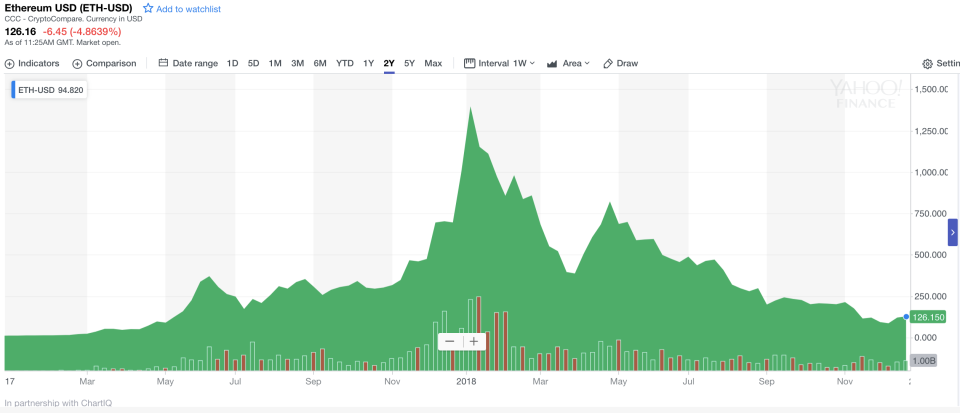The challenge for cryptocurrency firms in 2019: don't die

Many crypto companies will struggle to survive 2019, according to industry observers, after collapsing prices in 2018 depleted the reserves needed to fund their businesses.
Companies in the space are already laying off workers, shutting down operations, and scaling back plans in the face of significant headwinds.
“I think you definitely will see companies go bust,” said Anthony Maguire, a former Facebook employee who now runs a blockchain advisory and education business focused on emerging markets. “Tech startups go bust all the time. Sometimes they get swept under the rug in the sense that people just forget about them.”
From boom to bust
Cryptocurrencies exploded in popularity in 2017, largely thanks to two factors: bitcoin’s price and the explosion of ‘initial coin offerings’.
The price of bitcoin (BTC-USD) rose throughout 2017 and this attracted more and more investors to the market, most of whom hoped to make a fortune from the price rise. By December 2017, bitcoin was worth close to $20,000.
Meanwhile, “initial coin offerings” or ICOs exploded. This innovation was where startups issued their own digital tokens, structured a little like bitcoin, to fund their business. Most startups sold their tokens in exchange for ethereum, the second biggest digital currency. By the end of 2017, there were over 1,000 crypto tokens in circulation.
However, the crypto hype has unravelled this year.
Bitcoin’s price slid throughout 2018 and it now trades around $3,800. The market collapsed when the supply of new investors hoping to make money dried up. Without the speculators, those owning bitcoin found there was little demand or use for it.
At the same time, the prices of most ICO tokens have also collapsed as the projects have failed to deliver on their often lofty promises.
“We’ve got a 90% s***coin marketplace, where people have then lost money because the realisation has been there is no utility,” Edd Carlton, the head of OTC trading at BlockEx, told Yahoo Finance UK.
‘It’s easier when you have years of runway’
Crucially, the price of ethereum (ETH-USD) has also collapsed from over $1,000 in January 2018 to around $130 today. That means that startups that sold ICO tokens for ethereum have seen their cash piles dwindle unless they hedged their exposure somehow.

“There’s less propping up poorly managed companies now than there was in January,” Maguire told Yahoo Finance UK. “It’s easier when you have years and years of runway and huge valuations.”
The effects of the market slump are already being felt. Blogging website Steemit is axing 70% of staff after the collapse of its digital coin. SpankChain, an adult entertainment crypto project, is reducing its staffing levels by around 60% for similar reasons.
And ConsenSys, one of the most high-profile crypto companies, has announced plans to cut around 13% of staff. Reports since have suggested as many as 60% of staff at ConsenSys could eventually be let go.
Crypto miners — companies and individuals who underpin the network of coins like ethereum and bitcoin — are also struggling. The cost of “mining” bitcoin has risen even as prices have fallen, meaning the economics are increasingly challenging.
US bitcoin miner Gigawatt filed for bankruptcy in November and layoffs are underway at Bitmain, one of the largest bitcoin mining equipment makers in the world.
“We look at this correction as fairly healthy for the market,” Lucas Friss, head of business development at Cumberland Mining, told Yahoo Finance UK. Cumberland Mining is an over-the-counter cryptocurrency trading businesses owned by Chicago prop trading company DRW.
“There’s a lot of questionable projects and things out there that need to wash out of the system for the intelligent and the strong projects to come out the other side,” Friss said. He was speaking generally and didn’t single out any specific projects.
As well as crypto startups going under, Maguire predicted that many crypto investment funds will also shut down in 2019.
“You have a lot of funds that were started that aren’t going to survive,” he told Yahoo Finance UK. “Part of that is confirmation bias. If you bought bitcoin in January 2017, you probably think you’re an investment genius.”
However, like Friss, Maguire said this expected crypto clear out should ultimately be good for the space.
“People who are still going to [crypto] meet-ups right now are people who really care and people who are in it to really solve hard problems,” Maguire said. “I think what we’re going to have in 2019 is less hype, more hard work, and more deliverables.”
———
Oscar Williams-Grut covers banking, fintech, and finance for Yahoo Finance UK. Follow him on Twitter at @OscarWGrut.
Meanwhile…

 Yahoo Finance
Yahoo Finance 